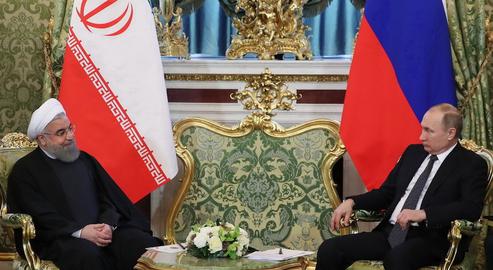Bassam Ibrahim, minister of higher education in the Syrian government, has stressed the importance of strengthening cooperation between Syrian and Iranian universities in the fields of both research and scientific production. He linked this to development and industrial projects in the two countries.
The comments came after Ibrahim attended a meeting in Tehran with President of Tehran University Dr. Seyyed Mohammad Moghimi and faculty deans. Dr. Shafiq Diop, the Syrian ambassador to Iran, was also present. The meeting focused on mutual benefit from modern technologies and nanotechnology, obtained through work plans set between Syrian and Iranian universities, according to what was published by the Syrian state-controlled news agency SANA.
Ibrahim also highlighted "the necessity of joint research and exchange programs for students and professors for future scientific and technological endeavors”, and joint supervision of postgraduate programs. For his part, Moghimi expressed Tehran’s “full readiness” to increase the number of scholarships for Syrian students and launch joint research projects.
In 2017, the Syrian Ministry of Higher Education announced 100 scholarships for undergraduates at Iranian universities, excluding medical schools, for the 2017-18 academic year. Dr. Mohammed Yasar Abdin, the president of Damascus University, and Moghimi had signed a memorandum of understanding that would shape all future agreements on shared research.
Also on January 23, 2020, the Syrian and Iranian Ministries of Education signed an agreement on the “exchange of expertise in scientific and educational fields”, SANA wrote, as well as technical support and the renovation of schools.
Is This a Good Idea for Syrian Students?
Numerous outlets including IranWire have previously explored the phenomenon of Iranian school textbooks, in which masonic conspiracy theories, antisemitism, anti-US sentiment and the Islamic Republic’s “revolutionary” ideology are interwoven with the standard curriculum. The Washington Post has also examined sectarianism in Iranian textbooks, writing that the lessons therein “revealed themselves to be acutely nationalistic, centered on producing and promoting a distinctly Iranian identity tied ineluctably to being a Shiite”.
Tahereh Kaghdachi, a prominent Iranian scholar, has highlighted numerous flaws in the Iranian educational system, stating that the repetitive and boring lessons destroy talent and student morale. In March this year, an Iranian official said one-third of Iranian school pupils were illiterate and unable to do basic sums. Scant resources and the brain drain in Iran mean higher education is also falling behind: not one Iranian university is in the global top 100, and across the entire, unusually large corpus of academic texts published by Iran, each article is only citing an average of 0.53 times – ranking Iranian scholarship 121st in the world for its relevance.
A Wider Game
Iran and Syria have signed 11 separate bilateral agreements in the economic, scientific, cultural, and housing spheres. Several Iranian companies, including Nikin, have recently obtained licenses to work in reconstruction and investment in Syria.
A previous report by IranWire revealed that commercial competition between Iran and Russia in Syria is not limited to oil, electricity, and other hard resources, but has expanded into education. Iran, for instance, is trying to launch Persian language classes in Syria and raise the level of awareness of Twelver Shia Islam. Russia has also tried to get its language and culture taught in schools in Syria. In 2014, Russian officially became a language on the Syrian middle-school and high-school Syrian, while a Russian language department was opened at Damascus University.
Tehran has also demanded that Persian be taught in Syrian schools. Last year, Iran signed one agreement that included, in part, assisting the Syrian regime in rebuilding its schools. Mohsen Haji-Mirzaei, Iran's then-minister of education, stressed “the importance of introducing the Persian language in the Syrian education system”.
Related coverage:
Gifts, Food Baskets and Boarding Schools: How Iran is Penetrating Syrian Society
Investigation: How Tehran Supported Bashar al-Assad's Presidential Campaign in Syria
Iran’s Soft War in Syria: Exerting Influence Through Arts and Education

























comments